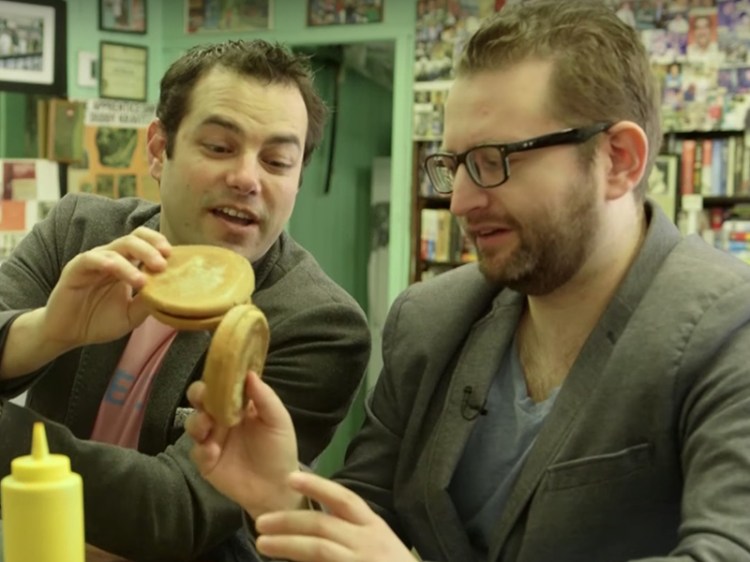My sisters and I have been ardent defenders of Montreal bagels for, well, forever – since long before bagels became generically American, rather than Jewish, and far longer than a preference for Montreal bagels over New York-style became such a badge of foodie cool.
Our devotion to these misshapen, malty bagels came about because, as children, we traveled to Montreal several times a year to see our large extended family. My mother grew up there in a prominent Jewish family in the 1930s and 1940s. She came to the United States for graduate school, and she stayed to marry my father.
Another Jewish Montreal food I remember well were dainty, pint-sized crustless sandwiches, which were served at every funeral in my family. Just last week, my mother, now 90, corrected me and spelled out the obvious: The finger sandwiches, she said, had nothing to do with Jewish food traditions. They were borrowed from English Montreal and its deep-seated ritual of afternoon tea.
Whoops.
Other than bagels, then, it’s surprising – shocking, really – how little I know about Jewish food in Montreal. The first time I ate a smoked meat sandwich, for instance, I was already a teen; my Uncle Jerry took me to Schwartz’s and introduced me to the sandwich-and-a-cherry-Coke routine he’d followed since his own Montreal childhood. I have clearer memories of rich, exquisite French pastries and après-ski quiches in Montreal than I do of Jewish food.

Movie poster for “Chewdaism.” Photo courtesy of the Maine Jewish Film Festival
So it was with special pleasure I watched “Chewdaism: A Taste of Jewish Montreal,” a 2018 documentary that filled in many gaps for me, not just about Montreal’s Jewish food but about Montreal Jews in general. The movie is screening on Nov. 3 at the Maine Jewish Film Festival’s first-ever Yiddish Festival.
Genial (read: supremely goofy) native Montrealers Jamie Elman and Eli Batalion, who make up Yiddish comedy team YidLife Crisis, take moviegoers on a daylong, carbohydrate-filled food tour of the city, beginning – of course – with bagels and moving on to salami and baloney sandwiches, smoked meat sandwiches, babka, hummus, knishes and a rollicking Sephardic Jewish feast (Sephardi Jews, who come from Spain and the Middle East, immigrated to Montreal in the 1960s and 1970s, many decades after my own Ashkenazi, or European, grandparents and great-grandparents arrived).
While walking (a little) and eating – make that noshing – (a lot), Elman and Batalion offer lessons of history and culture, visiting with Montreal chefs and bakers, restaurateurs, museum curators, historians, writers and shopkeepers to talk about the past, present and future of Jewish food, and Jews, in Montreal. “Chewdaism” is a caloric, playful, immensely charming and delicious romp.
“We never really went to synagogue,” Montrealer Sydney Warshaw says toward the end of the film. She is co-founder of The Wandering Chew, which hosts pop-up Jewish meals in Montreal, and – fun fact for me – granddaughter of an editor of “A Treasure for My Daughter,” an earnest Jewish cookbook first published in 1950 by Canada’s Hadassah, a copy of which my mother gave to me when I left home and inched into adulthood (I still have it). In the film, Warshaw motions toward the heaping plates of food on the table in front of them. “For me, this is synagogue.”
Amen to that.
Send questions/comments to the editors.



